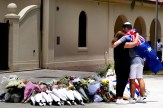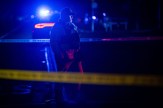Security expert testifies before Senate committee

The United States has made great strides in toppling major organizations that pose a threat to national security, said Stephen E. Flynn, the founding co-director of Northeastern’s George J. Kostas Research Institute for Homeland Security. He delivered his testimony on Wednesday to the Senate’s Committee on Homeland Security and Government Affairs.
But he struck a note of caution: The nation, he said, now more than a decade removed from 9/11, continues to remain at risk from small-scale attacks from homegrown terrorists and those loosely affiliated with al Qaeda.
“Major attacks require a group of operatives directed by a leader, communications with those overseeing the planning and time to conduct surveillance and rehearse the attack. … All this effort ends up creating multiple opportunities for detection and interception by intelligence and law enforcement officials,” Flynn testified. “Alternatively, small attacks carried out by one to three operatives, particularly if they reside in the United States, can be carried out with little planning on relatively short notice.”
He added: “As such, they are unlikely to attract the attention of the national intelligence community and the attacks, once underway, are almost impossible for the federal law enforcement community to stop.”
Wednesday’s hearing, which was convened by the committee’s chairman, Connecticut Senator Joseph Lieberman, aligned with Northeastern’s focus on use-inspired research that solves global challenges in health, security and sustainability.
In the hearing, Flynn also discussed the ongoing vulnerability of transportation systems to mass disruption and natural disasters as “the clearest and most present homeland security danger.”
The United States, he noted, is more likely to face terror threats than traditional military engagements because of its unique position as a global superpower.
“Quite simply, it has become reckless for our current and future adversaries to challenge the United States by engaging in the kind of warfare we are best prepared to fight,” Flynn said. “Their better option is to take the battle to the civil and economic space as opposed to engaging in direct combat with our second-to-none armed forces.”
Flynn, speaking as part of a high-level panel that included four-star Air Force general Michael Hayden, stressed the important role universities play in responding the cybersecurity threats and as an honest, nonpartisan broker between government and industry — the kind of work happening now at the new Kostas Institute. Chairman Lieberman expressed support for this model during the hearing.
Senators at the hearing — including Lieberman, ranking member Susan M. Collins (R-Me.), and Senators Scott Brown (R-Mass.) and John McCain (R-Az.) — engaged in substantive conversation over the future of national security legislation, with McCain expressing serious concerns over the prospect of passing cybersecurity legislation, just one of many national security topics discussed in depth.
In closing, Flynn noted that the nation’s best defense against a small-scale terror attack is a sense of national resilience, adding that terrorists rely on knowing that even a small attack will resonate on a national level.
“How we respond to acts of terrorism effects our adversaries’ calculations in undertaking these attacks,” Flynn said. “If we provide them with a ‘big bang’ for their relatively modest buck, we end up fueling the incentive for terrorist activity.”
Flynn’s testimony before the Senate committee followed a Tuesday meeting of the Department of Homeland Security’s Academic Advisory Committee, which was attended by Northeastern President Joseph E. Aoun, a committee member.
As the chair of the advisory council’s Subcommittee on Academic Research and Faculty Exchange, Aoun lead a discussion concerning the ways in which universities could address the needs of the Science and Technology Directorate of DHS.
Tara O’Tool, under secretary of the Science and Technology Directorate at DHS, noted that its lack of resources and diverse nature makes it difficult to articulate higher education’s role in addressing its grand challenges.
O’Tool praised the DHS University Centers of Excellence, one of which Northeastern leads, but suggested that the relationship between universities and the DHS should be reevaluated. This led to a very informative discussion among council members, but will require further deliberation before additional recommendations can be suggested by the Subcommittee to Secretary Janet Napolitano regarding ways in which the university community can further engage with DHS.





